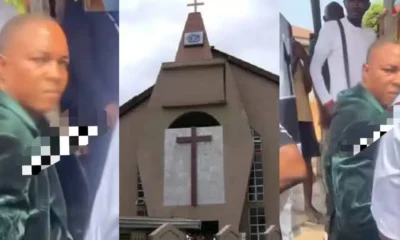NEWS
SPECIAL REPORT: Nigeria’s Slow Descent into Anarchy; Warnings Ignored, Blood Still Spills
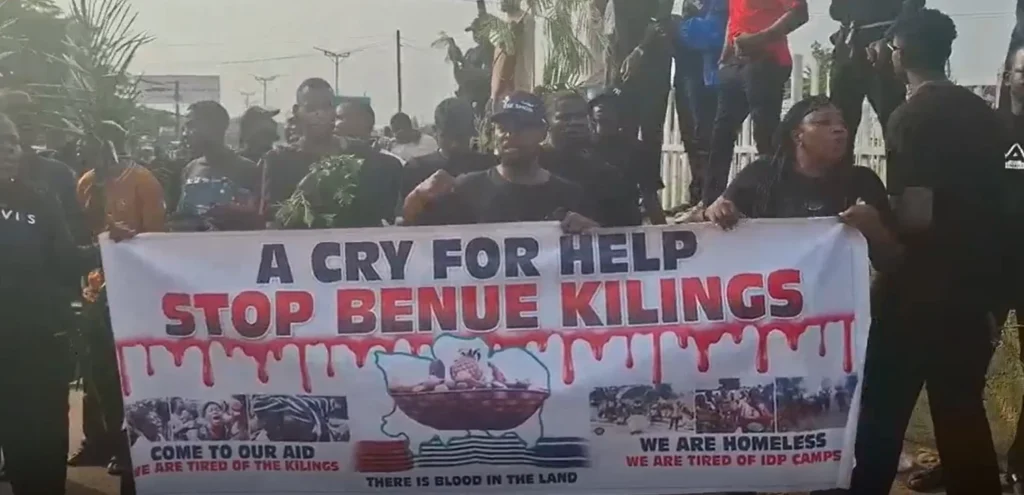
The recent chilling remarks by the Tor Tiv V, His Royal Majesty James Ayatse, have once again reopened a festering wound that Nigeria has for too long sought to cover with palliatives and false narratives.
Speaking during President Bola Tinubu’s visit to Benue State, a region now infamous for its relentless bloodletting, the monarch dismissed the widely publicised framing of the conflict as “herders-farmers clashes.” Instead, he described it as what it has always been for many in affected communities: a calculated, full-scale genocidal invasion and land-grabbing campaign.
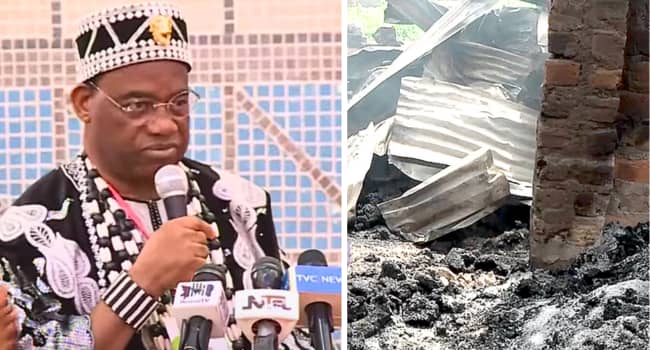
His words were neither hasty nor speculative. They were the anguished cry of a people whose cries have long been drowned by the state’s silence, half-hearted assurances, and outright denials.
And yet, amid the deafening noise of state rhetoric, one voice had for years warned of these unfolding horrors – Mazi Nnamdi Kanu. A name that polarises Nigeria’s socio-political space, no doubt. A man many dismiss as a “non-state actor,” a “leader of a proscribed group.” But beyond the labels, did we truly listen to the content of his warnings? Did we interrogate the depth of what he was saying; or were we too focused on discrediting the messenger to hear the message?
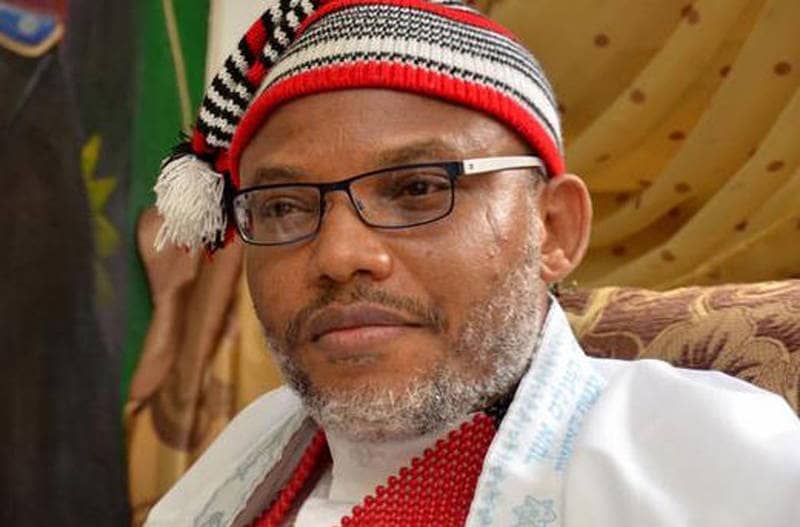
From Benue to Enugu, from Ekiti to Plateau and other parts of the country, the pattern of attacks remains hauntingly similar: well-armed marauders descend on largely defenceless communities, razing villages, displacing thousands, and in many cases, occupying the lands thereafter. Mazi Nnamdi Kanu spoke of these orchestrated invasions, the silence of complicit authorities, and a broader conspiracy to subjugate indigenous populations.
A Pattern, Not an Accident
Benue, Nigeria’s food basket, has turned into a field of mass graves. The Yelwata massacre in Guma LGA recently, where over 200 people were killed, is only one in a long line of genocidal episodes. These are not isolated incidents. These are not misunderstandings over grazing routes. These are tactical offensives.
Tor Tiv’s characterisation of the killings aligns with what Kanu repeatedly said: that these attacks are not borne of natural conflict between nomadic herders and local farmers, but a state-enabled invasion, facilitated in part by selective silence and institutional inaction. These attackers often move with GPS-enabled logistics, superior firepower, and a boldness that suggests they know no consequences await them. There are even unverified reports of these terrorists descending in helicopters to attack a community in Enugu.
State Helplessness or State Complicity?
Successive administrations, both at the federal and state levels, have shown a curious pattern of insensitivity on one hand and helplessness on the other. Victims are given condolence messages, mass burials are arranged, investigative panels are announced, and then the next killing happens. Why have these governments failed to address the root of the problem? Why do we keep hearing of “unknown gunmen” or “bandits” when survivors often give detailed accounts of the attackers’ identities and tactics?
Is it too far-fetched to consider that there are high-ranking enablers within and outside Nigeria who benefit politically, economically or religiously from this crisis? Mazi Nnamdi Kanu pointed fingers at this very class. For this, he was branded a terrorist. But who is the terrorist now; the man who rang the bell or the system that watched the fire and did nothing?
The Failure of National Security and the Need for a Rethink
Security, the primary obligation of government, has become Nigeria’s Achilles’ heel. There is a growing perception, sadly reinforced by events, that some lives in this country matter more than others. The North Central, Middle Belt, and parts of the South have been reduced to theatre stages of grief, while perpetrators walk free, often emboldened.
We must ask: How are these killers able to operate so freely across state lines? Who arms them? Who protects them? And more painfully, why is there no political will to stop them?
We can no longer afford the luxury of silence or the comfort of political correctness. If the security crisis is misdiagnosed as mere “herders-farmers clashes,” we will continue treating a bullet wound with a band-aid.
Back to the Drawing Board
The time has come for Nigeria to return to the drawing board. This means rethinking our federal structure, policing model, and national cohesion. Regional security outfits should not be seen as politics but as necessity. A mono-security structure in a heterogenous and fragmented nation has clearly failed. State police, community policing, and regional collaboration must be prioritised.
Furthermore, the media and civil society must hold government accountable not just for what is said, but what is done or left undone. False equivalence in reporting these massacres helps no one. What Benue is facing is not a misunderstanding. It is war.
Beyond Sentiments, Towards Truth
You don’t have to like Mazi Nnamdi Kanu to admit that some of what he warned about is now Nigeria’s daily reality. Disliking the man should not mean dismissing the truth he spoke. It is intellectually dishonest and morally irresponsible to ignore the message because of the messenger.
Nigeria is inching dangerously close to collapse, not because of her enemies, but because of her leaders’ refusal to see the truth and act decisively. This is a time for national honesty, not politics. Let us listen to our traditional rulers. Let us revisit the warnings we once mocked. Let us act, not tomorrow, but today.
Protect Nigerians. Or risk losing Nigeria altogether.
Discover more from Asiwaju Media
Subscribe to get the latest posts sent to your email.
-

 ENTERTAINMENT5 days ago
ENTERTAINMENT5 days agoRyan Taylor Claps Back At Fan Who Compared His Daughter To Ex-Fiancée DJ Cuppy
-

 NEWS3 days ago
NEWS3 days agoBenue Tragedy: Nigerian Woman Mourns After Losing Five Children and Mother in Yelwata Massacre
-

 NEWS4 days ago
NEWS4 days agoOkpuitumo Abandoned While Ikwo Politicians Feast on Power — Chika Amaga
-

 NEWS4 days ago
NEWS4 days agoBenue Bleeds While Tinubu Talks Reconciliation: Is the Pogrom a Cover for a Political War?
-

 POLITICS4 days ago
POLITICS4 days agoVideo of Ebonyi Lawmaker Firing Gun in Public Sparks Outrage
-
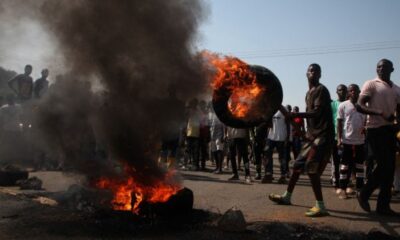
 EDITORIAL4 days ago
EDITORIAL4 days agoThe Benue Massacres and Nigeria’s Endless Failure to Protect Its People
-

 NEWS3 days ago
NEWS3 days agoChief of Defense Staff, Gen Musa Backs Benue Youth Vigilantes, Donates ₦150m for Yelewata Victims
-

 POLITICS3 days ago
POLITICS3 days agoNwali Celebrates Kelechi Igwe at 55, Hails His Impactful Legacy
-

 NEWS5 days ago
NEWS5 days agoReal Warri Pikin Announces She’s Expecting Fourth Child With Heartfelt Father’s Day Post
-

 NEWS3 days ago
NEWS3 days agoBenue Man Loses 20 Family Members In Yelwata Attack, Says Killers Burnt His Brothers Alive
-

 NEWS2 days ago
NEWS2 days agoTinubu Blasts IGP Egbetokun Over Failure to Arrest Benue Killers
-

 ENTERTAINMENT5 days ago
ENTERTAINMENT5 days agoTiwa Savage Reunites With Former English Teacher During London Performance






